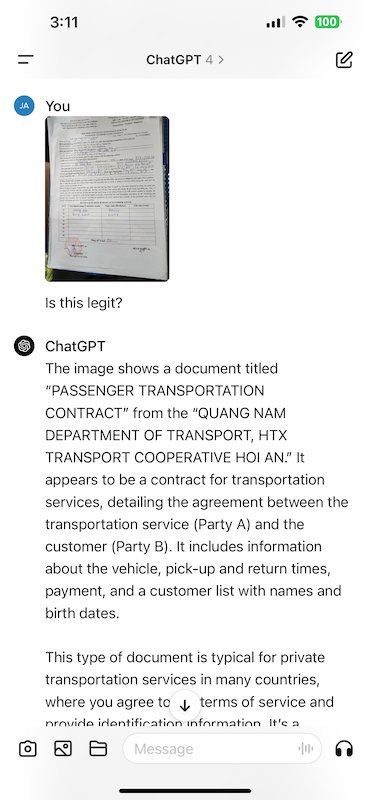How I Used ChatGPT to Avoid A Scam in Vietnam
I recently had an eye-opening experience with AI during my trip to Danang, Vietnam in December, 2023. During a Grab ride, I encountered a potential scam involving a document the driver insisted my cousin and I sign. In this moment of uncertainty, I turned to ChatGPT for guidance. I asked the app to check the legitimacy of the suspicious document, and it responded with a translation and a basic analysis of the document. This was sufficient information for us to judge that it was better to leave the vehicle and find another one.

This incident not only showcased a practical, life-altering application of AI but also highlighted two key areas for improvement when it comes to using AI in real-life scenarios.
Opportunities to make ChatGPT even better
Firstly, this incident highlighted the general unawareness of the potential uses of AI tools like ChatGPT in daily life, especially among non-technical individuals. My cousin, a smart and successful business development professional, did not consider utilizing ChatGPT in the situation. This difficulty in recognizing the use of AI in time-sensitive and potentially dangerous scenarios presents an important opportunity to enhance the simplicity and ease of use of ChatGPT.
Secondly, while ChatGPT was helpful, I realized that the tool could be even more proactive. In situations where quick decision-making is crucial, the ability of ChatGPT to autonomously conduct in-depth investigations and web searches without requiring follow-up prompts could greatly enhance its effectiveness as a solution in critical scenarios.
In conclusion, ChatGPT can help travellers avoid scams in foreign countries that use different languages. However, it is currently not obvious to use the product for such use cases. By making the product more intuitive and proactive in special scenarios, it probably can significantly expand its reach and effectiveness, ultimately delivering life-changing value to a broader audience.
